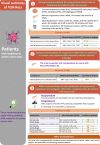Acupuncture for cancer pain: an evidence-based clinical practice guideline
- PMID: 34983587
- PMCID: PMC8728906
- DOI: 10.1186/s13020-021-00558-4
Acupuncture for cancer pain: an evidence-based clinical practice guideline
Abstract
Background: This study aims to develop an evidence-based clinical practice guideline of acupuncture in the treatment of patients with moderate and severe cancer pain.
Methods: The development of this guideline was triggered by a systematic review published in JAMA Oncology in 2020. We searched databases and websites for evidence on patient preferences and values, and other resources of using acupuncture for treatment of cancer pain. Recommendations were developed through a Delphi consensus of an international multidisciplinary panel including 13 western medicine oncologists, Chinese medicine/acupuncture clinical practitioners, and two patient representatives. The certainty of evidence, patient preferences and values, resources, and other factors were fully considered in formulating the recommendations. The Grading of Recommendations Assessment, Development, and Evaluation (GRADE) approach was employed to rate the certainty of evidence and the strength of recommendations.
Results: The guideline proposed three recommendations: (1) a strong recommendation for the treatment of acupuncture rather than no treatment to relieve pain in patients with moderate to severe cancer pain; (2) a weak recommendation for the combination treatments with acupuncture/acupressure to reduce pain intensity, decrease the opioid dose, and alleviate opioid-related side effects in moderate to severe cancer pain patients who are using analgesics; and (3) a strong recommendation for acupuncture in breast cancer patients to relieve their aromatase inhibitor-induced arthralgia.
Conclusion: This proposed guideline provides recommendations for the management of patients with cancer pain. The small sample sizes of evidence limit the strength of the recommendations and highlights the need for additional research.
Keywords: Acupuncture; Cancer pain; Evidence-based practice; Practice guideline.
© 2022. The Author(s).
Conflict of interest statement
The guideline development was initiated by the international Trustworthy traditional Chinese Medicine Recommendations (TCM Recs) Working Group. Guangdong Provincial Hospital of Chinese Medicine and Evidence-Based Medicine Centre of Lanzhou University led the guideline development following the universal methodology by reaching the final consensus based on the latest research evidence and multidisciplinary expert opinions. All guideline panel members have completed the TCM Recs interest disclosure form. The TCM Recs judged that no panel member had any financial conflict of interest. Professional and academic interests are minimized as much as possible. Besides, we declare that the guideline will not be disseminated for commercial promotions.
Figures
References
-
- World Health Organization. Cancer. https://www.who.int/news-room/fact-sheets/detail/cancer. 2018.
-
- World Health Organization. Latest global cancer data: cancer burden rises to 19.3 million new cases and 10.0 million cancer deaths in 2020. http://www.mbsonline.gov.au/internet/mbsonline/publishing.nsf/Content/43.... 2020.
-
- Laird B, Colvin L, Fallon M. Management of cancer pain: basic principles and neuropathic cancer pain. Eur J Cancer. 2008;44(8):1078–1082. - PubMed
-
- Portenoy RK. Treatment of cancer pain. Lancet. 2011;377(9784):2236–2247. - PubMed
-
- World Health Organization. WHO Guidelines for the pharmacological and radiotherapeutic management of cancer pain in adults and adolescents. https://www.who.int/publications/i/item/who-guidelines-for-the-pharmacol.... 2019. - PubMed
Publication types
Grants and funding
LinkOut - more resources
Full Text Sources
Medical



